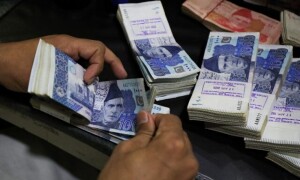Any regulation of the bitcoin crypto-currency should involve international co-operation to avoid loopholes, Japanese vice finance minister Jiro Aichi said on Thursday. Commenting on the closure this week of Tokyo-based Mt. Gox, once the world's biggest exchange for the bitcoin virtual currency, Aichi said the ministry would respond to the problems "if necessary", after finding out exactly what happened.
"It's not just the Ministry of Finance; many other agencies are related," Aichi told a news conference. "As for its legal position, a currency (under Japan's jurisdiction) would be coins or notes issued by the Bank of Japan. At the very least, we can say bitcoin is not a currency." The Mt. Gox website and Twitter feed went blank on Tuesday after weeks of turmoil. It suspended withdrawals on February 7 following a series of cyber attacks, leaving customers unable to recover their funds.
A document circulating on the internet saying that more than 744,000 bitcoins - worth around $423 million at current rates - were missing from Mt. Gox was created by a Tokyo-based consulting firm, said Ryan Selkis, a blogger who initially leaked scans of the document. Selkis, who uses the handle "twobitidiot", said in an email that the "Crisis Strategy Draft" had been written by consulting firm Mandalah in meetings with Mt. Gox CEO Mark Karpeles. On Wednesday, Karpeles had sought to assure investors that he was working with others to solve the problems. "As there is a lot of speculation regarding Mt. Gox and its future, I would like to use this opportunity to reassure everyone that I am still in Japan, and working very hard with the support of different parties to find a solution to our recent issues," he said in a statement posted on the Mt. Gox website.
While proponents of bitcoin hail its anonymity and lack of ties to traditional banking, regulators have become increasingly interested in the digital currency due to its volatility and usage by criminal elements. Bitcoins are created, or "mined", in a process using a network of computers that solve complex mathematical problems as part of a process that verifies and permanently records the details of every bitcoin transaction that is made. At current prices, the bitcoin market is worth about $7 billion.
The document leaked this week by Selkis - who says he sold all his bitcoins - said 744,408 bitcoins, or about 6 percent of the 12.4 million bitcoins in circulation, were "missing" due to thefts that exploited "malleability" in the code governing transactions, which the Bitcoin Foundation and others have blamed on Mt. Gox's customised software. "Mt. Gox has been broken and it was obvious there was something really bad going on there for nearly a year. They were processing withdrawals very slowly and generally being very opaque about what was going," said Mike Hearn, a bitcoin developer in Switzerland.
BR100
15,235
Increased By
150.4 (1%)
BR30
44,824
Increased By
812 (1.85%)
KSE100
149,971
Increased By
1353.3 (0.91%)
KSE30
45,655
Increased By
407.2 (0.9%)






















Comments
Comments are closed.